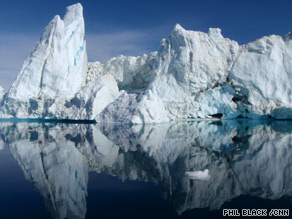By Phil Black
CNN
CNN

Melting world: mountainous icebergs in Greeland's Sermilik Fjord.
William tells me he went out on a boat with some friends a few days ago and shot the whale. I'm not sure how I feel about this.
Welcome to Greenland. On this remote but enormous island subsistence whale hunting is allowed.
This was just the memorable start to an extraordinary journey.
Cameraman Neil Bennett and I had traveled to the small town of Tasiilaq in southeastern Greenland to meet up with the Arctic Sunrise, a ship belonging to the environmental group Greenpeace. Read Neil's blog on filming in challenging conditions
The 34-year-old icebreaker and its crew are on a three month expedition around Greenland's coast. They say their mission is to help scientists working in the region and to publicize the environmental changes taking place here.
Over the next four days we observe independent scientists working to understand why the ice sheet is melting so rapidly.
We fly over and land on Helheim Glacier, a major outlet for the ice sheet which has sped up dramatically in the last decade.
We accompany oceanographers in inflatable boats as they collect data on the warming water currents in the fjord. All this research, they say, points to sea levels rising beyond current predictions.
There are still those who question humankind's role in the warming of the Earth's climate, but these scientists are not among them.
"Things could be very bad," glaciologist Dr Gordon Hamilton tells me. "If we don't start to do something about it now we'll very quickly reach a tipping point from which there'll be no return. And the consequences for society as a whole would be catastrophic."
Joining Greenpeace on this expedition was a difficult decision for CNN. Does it compromise our editorial independence on what can still be a highly divisive issue?


No comments:
Post a Comment